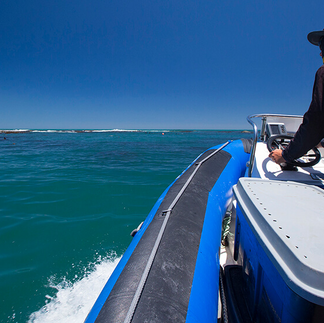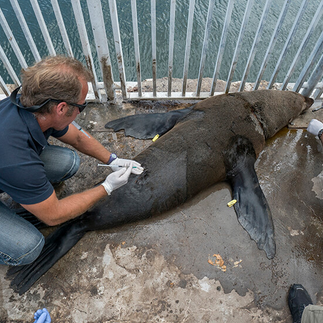Animal Ocean helping Fur Seals
- carlyhannahkruyer
- Sep 4, 2019
- 3 min read
Updated: Feb 28, 2024
We at Animal Ocean know that our guest want to know that the interest of our Fur seals to come first, before the business of running Seal Snorkeling trips. There are many eco-tourism business across the world that are only gaining from animal interaction trips and not looking after the animals they rely on. There is a strong trend toward more responsible animal interaction tourism experiences such as this article on BBC news. We though it would be nice to share with you here what we have been doing over the years to help our Fur seals.
Beach Clean ups
Keeping pollution of the ocean is the first step in preventing Fur seals and other marine life from becoming entangled or eating plastic pollution. In 2017 Animal Ocean actively organised and ran beach clean-ups once a month along Hout Bay beach, totalling 12 clean ups and an estimated 500 kg's of rubbish and micro-plastics removed. In 2018 and 2019 we have teamed up with other passionate groups and contributed towards larger community based Beach Clean-Ups. Our involvement in Beach Cleanups is on going.
Research
In 2017 Animal Ocean initiated a project with Prof. Justin O'Riain from the Institute for Communities and Wildlife in Africa (ICWild) at the University of Cape Town (UCT) This project was initiated by us as a first attempt to become involved with this institute and start the research into Fur Seal Tourism in Cape Town.
The first project we hosted and developed in 2017 with ICWild was a simple color sensitivity test run by Dayna Hegarty to complete here Bachelor of Science (Honors) degree. Here findings helped us confirm and change the way we operate by document which colors attract extra attention by the Fur seals.
We are currently hosting and working with Trygve Heide and Prof. Justin O'Riain on a larger project as a Masters thesis. This project will focus on Fur Seal and tourist interactions, assessing if tourism has any impact on the behaviour of the Fur seals we work with. we will also develop some socio-economic aspects to the project primarily looking at the value of Fur seals to the South African economy as well as tourists perceptions about this form of eco-tourism.
Fur Seal welfare
As our boats and staff are constantly on the water running snorkeling trips we often encounter Fur seal pups that have naturally been washed off the rocks. During December when the pups are still unable to swim they often drown when falling into the water. Our policy is to collect these helpless pups and put them back on the island. Once back in a pup crèche they will have a chance of being found by their mother. Fur seals recognise each other by their calls and the mother will find her pup even if move to another part of the island. One exceptional day was in 2014 when we rescued about 100 pups in a single day, putting them back on Duiker Island. On a normal year we rescue 5-10 pups during this vulnerable time.
Disentanglements in Hout Bay harbor
Fur seals are prone to getting plastic and fishing line entangled around their necks, acting as a snare. This causes a slow and painful; death if not treated. When possible we enter the water and cut the Fur seal free. This is very hard to do and our success rate is low, as there are many escape routes for the injured Fur seals, but we do succeed if the animal is sleeping and we are able to get close. Help a look at the video (Blog) where we disentangled a seal caught in a fishing net at Duiker Island.
Advanced Fur seal care
Animal ocean assisted the Two Oceans Aquariums seal team on call outs for injured seals ass well as raising awareness for their seal related projects. This year Brett Gardner, an Australian based vet, trained staff of the Two Oceans Aquarium and City of Cape Town in the technique how tranquillising Fur seals for better care and disentanglement. Animal Ocean provided boat support as well as photographic and film documentation of the training. This will be use to raise awareness and funding for this expensive procedure.
Fur seals and the Law.
Cape fur seals and their colonies are protected under the National Environmental Management: Biodiversity Act (2004) and the Threatened or Protected Species (TOPS) Regulations. The Law says that no swimmer me be 5m from a colony and no boat 30m from a colony. We adhere to these laws in our Seal Snorkeling trips.
Raising Funds
We believe in the Two Oceans Aquariums work and help support that when ever possible. We collect donations from our seal snorkeling clients that go directly towards purchasing equipment to help seals get better Veterinary care. This has just started and is something we would like to pursue.
















Comments